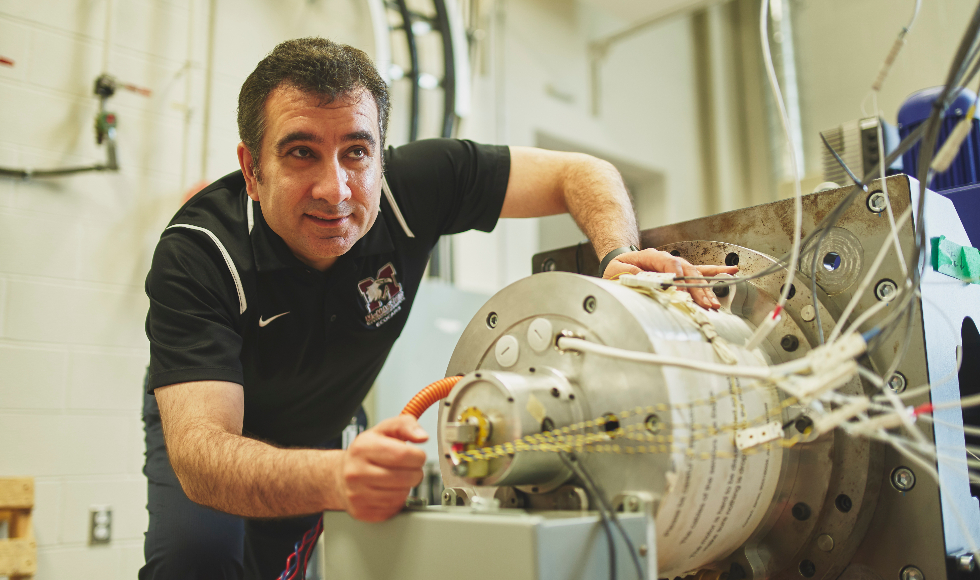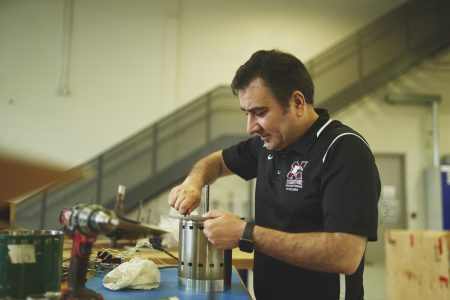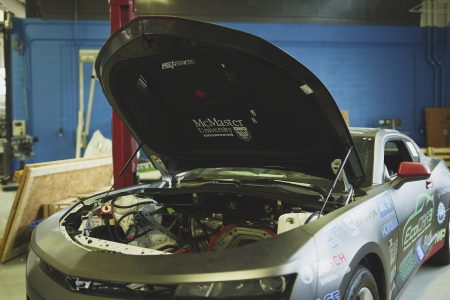Engineering and electrifying the next generation of cars

Photo by Jin Lee.
BY Michelle Pressé
July 8, 2019
If you pick a letter from the alphabet, chances are Ali Emadi has a title with that capital letter.
Professor. Lead Faculty Advisor for the McMaster Engineering EcoCAR Mobility Challenge. Canada Research Chair in Transportation Electrification and Smart Mobility. Canada Excellence Researcher Laureate. Canada Excellence Research Chair in Hybrid Powertrain. NSERC Industrial Research Chair in Electrified Powertrains. Mentor.
These are a few of them. The last is one of his favourites.
“Students are the future for not only the industry, but the future of us,” says Emadi. “It’s always great to work with students to create knowledge to help the auto industry move towards a more sustainable solution and train them to do wonderful things after they graduate from McMaster Engineering.”
Romina Rodriguez, a PhD student in mechanical engineering, says she “won the lottery” by having Emadi as her advisor.
“I see how passionate he is about his work and how he deals with all of the industry projects and students,” says Rodriguez. “It sort of rubs off on you — you become really interested in what you’re doing. Your projects have real-world impact.”

Emadi’s research focuses on pioneering sustainable energy-efficient solutions from advanced power electronic converters and electric motor drives to electric, hybrid electric and plug-in hybrid electric.
He says engineering the next generation of cars requires autonomy, capability and, most importantly, high efficiency with lower or zero emissions.
“Energy and sustainability are of critical importance to the planet,” says Emadi. “If we want to make the transportation system more sustainable, we need to electrify transportation. That way, we can improve sustainability, reduce emissions and come up with cleaner cars and cleaner environments.”
So how exactly does one go about developing one of North America’s best transportation electrification programs?
Emadi says the McMaster Automotive Resource Centre’s (MARC) multidisciplinary approach within the Faculty of Engineering, and beyond, is instrumental.
MARC, one of North America’s leading research facilities in electric and hybrid vehicles, allows researchers like Emadi, as well as students and industry leaders — not just in engineering, but in science and social science — to work towards resolving the issues facing the automotive industry.
Some of these resolutions include the development of hybrid and electric powertrains, building highly efficient and cost-effective powertrain components and identifying light materials to make cars more fuel efficient.

One of the greatest challenges in addressing climate change, says Emadi, is our dependency on fossil fuels — emissions are high, efficiencies are low.
“If we want to address climate change, we need to tackle the issues for the auto industry,” says Emadi. “I believe the best, most practical long-term solution for transportation is electrification.”
Lea Dorn-Gomba, a postdoctoral fellow in electrical engineering, says having Emadi as her advisor has helped her push beyond her limits.
“As a mentor, [Emadi] is really human,” says Dorn-Gomba.“Even if he is very busy, he always tries to make time for you, whether it’s technical or personal… He has a lot of influence. He also has a lot of experience so it helps you to look at the big picture.”
For Emadi, big-picture thinking — and the foundation of being an engineer — requires examining the thing you love and its impact on society.
If its impact isn’t positive, you have a responsibility to fix it.
“Cars provide the biggest technical field spectrum of technologies that a lot of people feel passionate about,” says Emadi. “I personally love cars, I love working on cars, I love making them more efficient, safer… Improving their reliability and improving their usage in society.
“The goal is to reduce dependency on fossil fuels and improve efficiency in transportation so we make transportation more sustainable. The world will be brighter because of that.”

